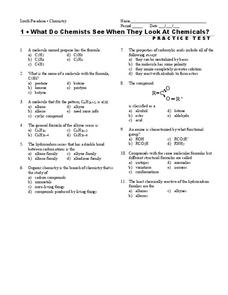Curated OER
The Ties that Bind
In this bonding worksheet, students read about the types of bonds that hold compounds together. They are given fifteen common materials and they identify the types of bonds that hold each together.
Curated OER
Energy and Matter
A review of a full unit on energy and matter, this slide show starts with basic definitions of states of matter and their mass. It then develops the ideas of the forces that that matter can exert. Details about bonding within matter and...
Pingry School
Comparing Activities of Selected Metals
Don't overreact! A simple experiment demonstrates chemical reactions as scholars mix chemical solutions and metals in a large well plate. They note all changes to the metals, solutions, precipitate, colors, and more. A full data table...
Curated OER
Hydrocarbons
In this chemistry worksheet, students use the clues given at the bottom of the sheet to complete the crossword puzzle on hydrocarbons. There are 17 statements to solve and fill in on the puzzle.
Curated OER
Bonding Basics - Covalent Bonds
In this chemistry worksheet, students complete the chart for each of the given elements by naming the number of protons, electrons, Valence electrons, and the electrons used to fill the outer shell. Then they complete each covalent bond...
Curated OER
Balancing Chemical Equations
Ninth graders explain how atoms and molecules form different substances during chemical reactions and how these processes require losing, gaining or sharing electrons. They correctly write chemical formulas and show how a balanced...
Curated OER
What Information is on the Periodic Table?
In this elements worksheet, students review the information that is found on a periodic table including atomic mass, chemical symbol, atomic, number, and electron configuration. This worksheet has 7 fill in the blank questions.
Curated OER
Ionic Chemical Formulas Days 1 & 2
Students study polyatomic ions and write binary and ternary ionic chemical formulas. They explore putting together different monatomic ions and coming up with as many chemical formulas as possible. They play a game similar to memory...
Curated OER
IPC Chemistry Review
In this chemistry review activity, high schoolers classify and name compounds, calculate atomic mass, draw Lewis Dot Diagrams, and determine number of protons for atoms. This activity has 37 fill in the blank, 38 matching, and 3 short...
Curated OER
Evidence for Hydrogen Bonds
In this hydrogen bonds worksheet, students use three data tables showing the boiling points for various compounds containing hydrogen to create three graphs for comparison.
National Institute of Open Schooling
Coordination Compounds
Cyanide, a coordination compound, is used in the extraction of gold and silver. Part 24 in the series of 36 delves into the world of coordination compounds. Classes learn, through readings, discussions, and answering questions, how to...
T. Trimpe
Atomic Basics
Get down to basics with these worksheets on the structure of atoms. Challenging young chemists to identify information from the periodic table and create Bohr diagrams and Lewis dot structures for different elements, this resource would...
National Institute of Open Schooling
Aldehydes, Ketones and Carboxylic Acids
Although their name makes them sound dangerous or toxic, carboxylic acids are found throughout nature in things such as citric acid, vinegar, and even in your DNA. Through detailed readings, discussions, and answering questions...
National Institute of Open Schooling
p-Block Elements and Their Compounds – II
Ozone, made of three bonded oxygen atoms, is found 15-30 km above Earth, has a strong smell, is blue, and blocks sunlight from hitting the surface of Earth. The 22nd lesson in a series of 36 specifically focuses on the important elements...
Curated OER
The Speed of Chemistry
In this rates of chemical reactions worksheet, students read about the various factors that influence the rate of chemical reactions such as surface area, concentration, temperature and catalysts. Students answer eight questions about...
Curated OER
What do Chemists See When they Look at Chemicals?
In this chemicals worksheet, students answer 15 multiple choice questions about chemicals, compounds, inorganic and organic molecules.
Curated OER
Chemistry of Food
In this chemistry of food worksheet, students complete 20 various types of questions related to food and nutrition. First, they complete a crossword puzzle with vocabulary terms. Then, students use the figure shown to write the...
Curated OER
Chemical Reactions
Students work in groups to define chemistry vocabulary including the terms reactants, products, exothermic and endothermic. They then combine the group definitions to arrive at a consensus definition for the class. Students also listen...
Curated OER
Bouncing Balls
Students create a polymer ball in the lab. In this chemistry lesson, students identify the different properties of the polymer they created. They explain what type of chemical reaction took place.
Curated OER
Activity #13 Changing The Look of Sugar
Students observe what happens when sugar is dissolved in water and when it is heated. They weigh the products after each of the two experiments on a balance scale. Pupils distinguish between physical and chemical changes. Students are...
Curated OER
Hydrocarbons
This worksheet would provide a great assessment for teachers to test student knowledge. High schoolers are asked to complete 3 charts which characterize types of chemical bonds such as alkanes, alkenes, or alkynes. They must also...
Curated OER
Hybridization
In this chemical compounds worksheet, students draw the Lewis structure and "cloud" structures for given compounds. Then students match the Lewis structure with the correct cloud diagrams. This worksheet has 2 problems to solve.
Curated OER
Activity #9 Tye Green Blob
Students comprehend that a chemcial change produce substances with a different composition and physical and chemcial properties. They state the differences between physical and chemical changes. Pupils observe changes that occur during...
Curated OER
Endothermic or Exothermic Reactions
In this chemical reaction instructional activity, students determine if given reactions are endothermic or exothermic reactions. Students determine the energy released or consumed when chemical reactions occur. This instructional...

























